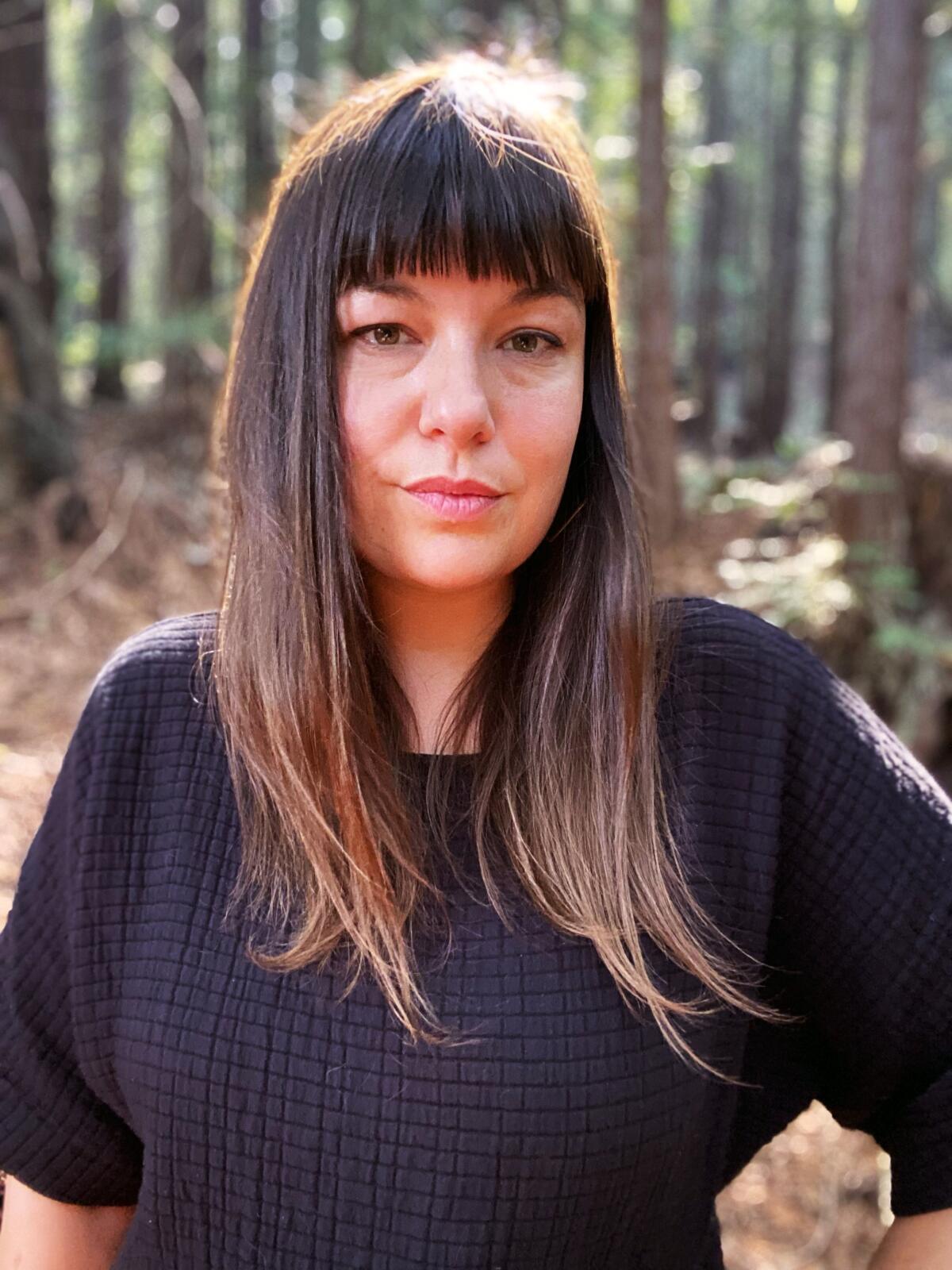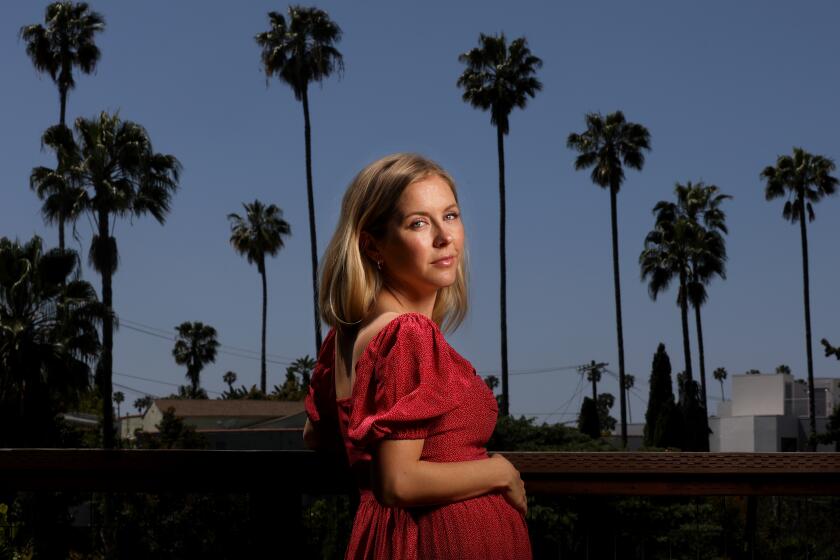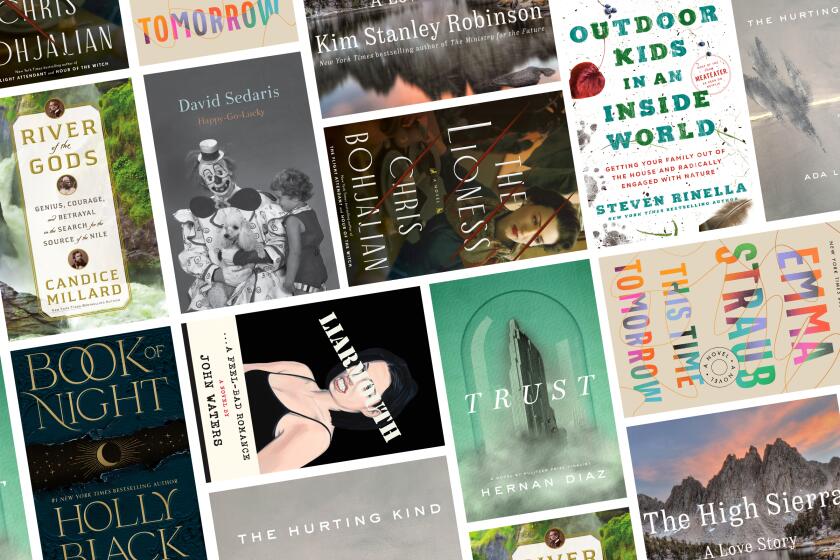With ‘Yerba Buena,’ a top L.A. author of queer YA romance is all grown up

- Share via
On the Shelf
Yerba Buena
By Nina Lacour
Flatiron: 304 pages, $27
If you buy books linked on our site, The Times may earn a commission from Bookshop.org, whose fees support independent bookstores.
Among the pleasures of reading Sarah Waters’ groundbreaking novels is inhabiting a world of queer women who are not representatives of sexual identity but merely, gloriously, human. Since Waters wrote “Tipping the Velvet” and “Fingersmith” there have been scores, if not hundreds, of lesbian writers whose books have changed lives. Some are truly great, others just OK, as with any category of books. Nina LaCour’s new novel, “Yerba Buena,” comes closer to Waters than most in generating a feeling that might best be described as complete safety in an author’s hands; you sense she understands her characters so well that you can sit back, sink in and trust the story.
LaCour has been rightly celebrated for her young-adult novels about same-sex relationships, including “Everything Leads to You,” “Hold Still” and “The Disenchantments.” Now she brings her specific mix of realism and romance to an adult audience. Sara Foster and Emilie Dubois have wildly different backgrounds and interests. Sara, who left home at 16 and worked her way up to the position of bartender at the popular restaurant Yerba Buena, first spots Emilie when she shows up to work as a floral designer there. Emilie’s Creole grandparents have kept their small family tight and loving — and traditional.
Both women have complicated siblings. Sara’s younger brother Spencer returns to her life after she guiltily abandoned him, then 5, to a neglectful father. Emilie’s sister Colette bounces in and out of rehab programs. These “unfinished” relationships provide a clue to where LaCour diverges from Waters; the former is less interested in showing how a partner might provide strength and comfort in dark times than in examining why a partner might not always be the right idea.
Nina LaCour’s new novel, “Everything Leads to You,” is a modern Los Angeles love story in which friendship and attraction cross lines of class, ethnicity and sexuality and where young people find real pleasure, drama and creative possibilities in work.
The trouble with LaCour’s approach is that it takes a while for Sara and Emilie to come completely alive, even though their creator clearly knows them so well. You can feel their attraction to each other, but you can’t see them as individuals (this may in fact be an obstacle to their union). They’re each talented and resourceful and almost impossible to tell apart, and not because they’re both young women: It’s because they’re unspecific.
What works best for LaCour in YA writing works against her, to some extent, in “Yerba Buena.” The author understands what it takes for a character to mature. Emilie, for example, dislikes her life as a floral designer and her dead-end affair with the restaurant’s married owner, whose wife and two children always take precedence over his supposed longing for Emilie. After moving into her terminally ill grandmother’s garage to care for her, she finally discovers her calling when she and her father spend long days together ripping out carpet and wallpaper so that Emilie can renovate the place.

Life changes do happen like this. A person finds the kind of work they love and leans in. Before long, Emilie has become a de facto apprentice to Ulan, an older Filipino immigrant contractor who teaches her everything from measuring properly to hiring the right people. She flips her grandmother’s house for an excellent profit, buys an Ocean Drive mansion in disrepair and sets about restoring it to glory — which is when Sara reappears.
For a short time, all is well and all is steamy, Sara and Emilie happily conjoining in one bedroom while Colette, newly separated from her rehab/cult, moves in downstairs to start a sober life. However, any reader who has been paying attention from the beginning, when Sara and her friend Grant run off as teenagers from their sad lives in Northern California, will know Sara’s maturation will be much more difficult than Emilie’s, trailed by genuine trauma.
Sara fell in love with her friend Annie when they were both 14 — and then Annie was found dead in the local river, an event that partly prompted Sara’s flight. After her relationship with Emilie hits some rocks, Sara decides to head back home, partly to solve the cold case of Annie’s murder. The unsettling answers she finds there give her the confidence to move forward, closing up the second maturation plot.
Readers thought Stephanie Danler’s debut novel, “Sweetbitter,” was autobiography. The reality, in her memoir “Stray,” is far more painfully dramatic.
LaCour turns out to have been writing a story about falling out of love, partly because one partner hasn’t yet learned to love herself. That isn’t necessarily a new concept, but here it feels fresh, and not because the lovers are both women — once again, LaCour manages to make that a given, part of life’s path — but because they’re young and unformed. (Rest assured, this isn’t a spoiler; there are twists to come.)
The book’s title refers to a wild herb of the mint family that has medicinal and edible uses; its translation of “good herb” might make you think it will be what binds Emilie and Sara together. Late in the story, as Sara mixes the signature cocktail of Yerba Buena (the restaurant), she’ll run out of the good herb and substitute straight-up mint. “She sipped again—the leafy brightness, the herbal and the bitter and the sweet.” Sometimes, Sara realizes, it’s fine for “something healing to have a tinge of heartbreak, too.”
This is what we all learn as we move on from young adulthood. It’s something LaCour is learning too. “Yerba Buena” has some fits and starts as its author makes her own transition to more mature subjects, but it is sweet and bitter and full enough to assure me that she has all the ingredients she needs for the next, older and wiser novel.
Patrick is a freelance critic who tweets @TheBookMaven.
Nina LaCour will discuss her book at Diesel, A Bookstore, on June 5 and at Vroman’s on June 7.
Bethanne Patrick’s May highlights include new fiction by John Waters, Chris Bohjalian and Emma Straub, fresh David Sedaris, breakout poetry and more.
More to Read
Sign up for our Book Club newsletter
Get the latest news, events and more from the Los Angeles Times Book Club, and help us get L.A. reading and talking.
You may occasionally receive promotional content from the Los Angeles Times.











